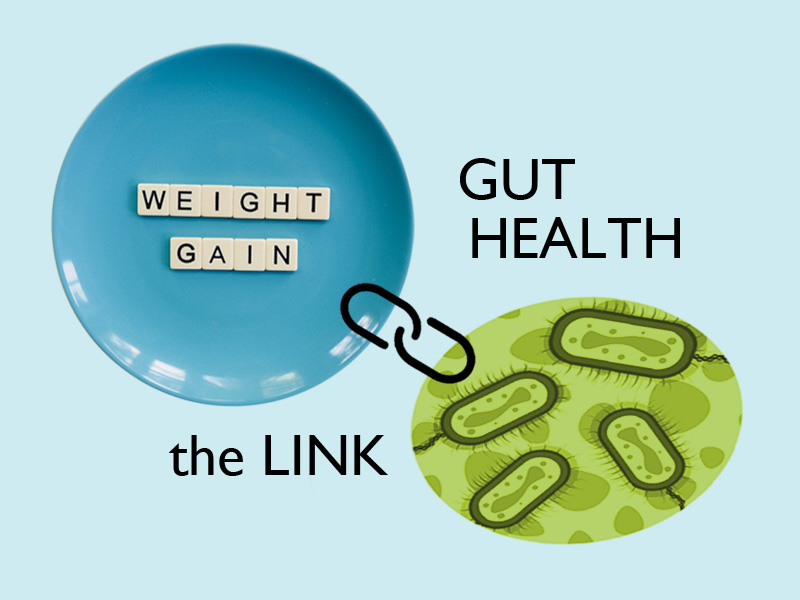
Weight gain. Weight gain. Weight gain. How many articles have you read so far about how to lose weight? How many unsuccessful diets or fads have you tried to lose weight? What if weight loss wasn’t that complicated? What if all you had to do to maintain a healthy weight was to take care of your gut health?
What is Gut Health?
Your gut is made up of all of the parts of your gastrointestinal tract. “Gut health” describes the balance and function of the microbes in your gut. Trillions of microbes live in your digestive tract. Don’t worry! That’s a good thing! So good that your gut microbiome is also called your “second brain.”
Moreover, every gut microbiome is unique and an individual’s genetics and environment both shape it. So, if you want to be healthy, it’s crucial that your microbiome be healthy and that the microbes in it are in balance with one another.
The Importance of Gut Health
Remember biology class? You may not have covered gut health in detail, but teachers made it clear that the food you eat breaks down into a simple form that can enter your bloodstream to deliver nutrients to your body. If your gut isn’t healthy, then this system is not effective, and your body isn’t getting its share of nutrients.
A healthy gut also contains all kinds of microbes and immune cells that ward off infectious agents like viruses, bacteria, and fungi.
Your gut also communicates with your brain through nerves and hormones – which supports your general health and wellbeing.
How Do Gut Bacteria Affect Your Weight?
Obesity and Poor Gut Health
Your microbiome affects how you digest and absorb food and how you store dietary fats in your body. Obesity can be due to multiple factors, but more and more studies show that poor gut health can contribute to obesity.
This is because a gut “dysbiosis” is an unhealthy balance of gut microbes that can cause
- a decrease in the diversity of microbes and
- a shift in the ratio of “healthy” and “unhealthy” microbes.
Hormones and Poor Gut Health
In addition, your gut health may have an impact on your hormones. And we’re not just talking about hunger hormones. We’re talking about estrogen levels. Women know all about the thickening around the middle that happens for many women during menopause. But did you know that one of the reasons for weight gain during menopause has to do with your estrobolome?
The estrobolome is a woman’s gut’s estrogen-specific microbial network. That’s a bit of a mouthful, but it works like this. The estrobolome effectively metabolizes estrogen and keeps estrogen levels in check. When a woman enters perimenopause, her gut health undergoes a serious change that can increase menopausal symptoms, including weight gain.
If you struggle with weight gain due to a hormone imbalance during menopause, talk with your doctor about a treatment plan that can help you manage weight and relieve other menopausal symptoms. It might include
- hormone optimization,
- targeted and personalized nutraceutical support,
- improving your gut health, and
- diet and lifestyle changes.
IBS, Gut Health, and Weight Gain
Inflammation and IBS go hand in hand. An unhealthy gut can increase inflammatory markers, which may lead to IBS symptoms, weight gain, and metabolic disease.
When it comes to IBS, your first thought is probably not about weight gain. But it turns out that many people with IBS gain weight because they stick to certain foods to keep their symptoms at bay. However, these foods often contain more calories than required for optimal weight.
In addition, there’s research that has linked being overweight and having IBS. Like the estrobolome, certain hormones made in the digestive tract regulate weight. These hormone levels appear to be at the lower end of normal ranges in people with IBS.
If you aren’t sure whether or not IBS is an issue for you, talk with your doctor. Although IBS tests do not yet exist, your doctor can work with you to rule out other possibilities. Once diagnosed, you can begin a treatment that will likely include a change in your current diet and other ways to support a healthy gut.
Acid Reflux, Gut Health, and Weight Gain
Everyone gets acid reflux from time to time, but if you have mild reflux more than twice a week or moderate reflux once a week, you probably have gastroesophageal reflux disease (GERD). There are a variety of acid reflux tests that your doctor can perform to diagnose GERD. If you notice that your GERD symptoms get worse when you pick up a few pounds, then there’s probably a connection between your weight gain and your underlying gut health.
The explanation goes like this. If you have chronic heartburn or GERD, this may be caused by a Small Intestine Bacterial Overgrowth or SIBO. When you have SIBO, you have too many bacteria in the upper part of your small intestine – a place where these particular microorganisms really shouldn’t be!
A shift in the balance of “good” vs. “bad” flora in your microbiome could also cause it.
Improving Gut Health
You can start improving your gut health today by making changes in your diet and lifestyle. Examples of changes you can make that will benefit your gut bacteria are:
- Increase your fiber intake to 30 grams of fiber per day.
- Review your medications with your healthcare provider to see if they might be affecting your microbiome.
- Add more fermented foods like yogurt, kimchi, sauerkraut, and kombucha to your diet.
- Eat more polyphenols found in various fruits and vegetables.
- Discuss prebiotics, probiotics, and synbiotics with your healthcare provider.
- Avoid artificial sweeteners, alcohol, and caffeine.
Wondering how your gut health is affecting your weight or overall health? We can help!
Our GI Map can assess your GI microbiome to get a clearer picture of what’s going on in your biome. Contact us for a consultation today!

A Medical Director, and one of the first physicians to join the Nava Health & Vitality Center, Dr. Douglas Lord has made significant contributions to our Center and its founding principles. Dr. Lord has helped develop and implement the Nava Method™—Nava’s proprietary approach to total body wellness. He has also been instrumental in liaising with other expert practitioners to successfully implement Nava’s range of therapies, treatments, and products.